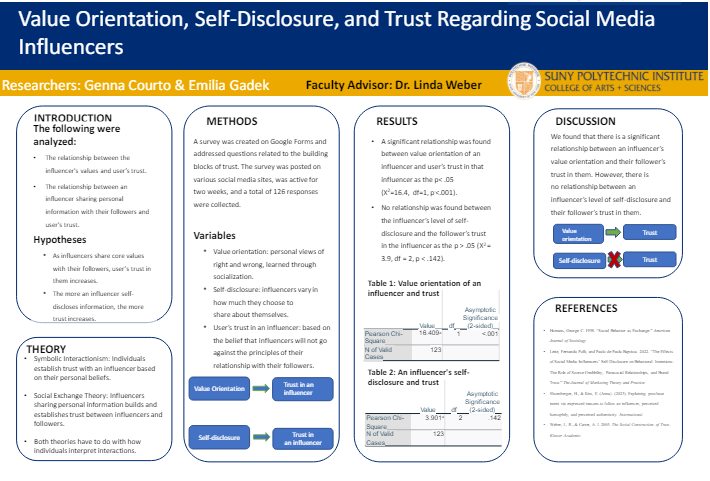Value Orientation, Self-Disclosure, and Trust Regarding Social Media Influencers
Genna Courto, Emilia Gadek, Linda Weber
Sociology, College of Arts and Sciences, SUNY Polytechnic Institute, Utica, NY, USA
In today’s digital age, most individuals have some type of social media account where they follow various influencers. These influencers use the building blocks of trust to foster relationships with their followers. The objective of this study is to observe the relationship between 1) the value orientation of an influencer and their follower’s trust in them, and 2) an influencer’s level of self-disclosure and follower’s trust in them. For our 3rd variables, we chose the age and gender of an influencer. We are examining whether or not the age of an influencer impacts the relationship between value orientation and trust, as well as whether or not the gender of an influencer affects the relationship between self-disclosure and trust. To explore this relationship, a survey was created on Google Forms and took participants approximately 5 minutes to complete. The survey was posted on various social media platforms such as Instagram, Facebook, Snapchat, and TikTok. Participants were given information about the study’s purpose and instructions before starting. Participants also had to be 18 years and over to complete the survey. The survey was available for approximately two weeks and received 126 responses. From there, the data was exported to Excel and then into SPSS to conduct a frequency analysis of the variables. A chi-square test revealed a significant relationship between the value orientation of an influencer and the user’s trust in them (X2=16.4, df = 1, p-value =<.001). The age of the influencer did not impact the relationship between an influencer’s value orientation and the user’s trust in them (younger; X2 = 10.2, df = 1, p= .001, older; X2 = 6.9, df = 1, p= .014). Regardless of age, value orientation affects users’ trust in that influencer. A chi-square test revealed an insignificant relationship between the influencer’s level of self-disclosure and the follower’s trust in them (X2 = 3.901, df = 2, p < .142). The gender of the influencer also has no impact on this relationship. For females (X2 = 1.077, df = 2, p < .584) and for males (X2 = 5.199, df = 2, p < .074). Social media and influencers play a big part in providing information and entertainment and purchasing ads/deals, among other things. It’s crucial to understand the building blocks of trust, and how these affect the amount of trust a user has in an influencer.

